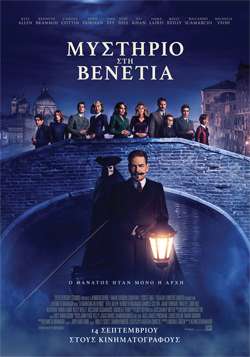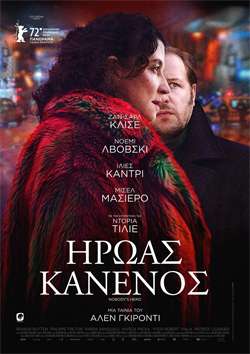
by Takis Garis (@takisgaris)
Episode 6 - Moderate Expectations
> THE COMPANY YOU KEEP (5/10)
The classic ancient greek tragedy poet Euripides (480-406 BC) has left us the maxim “A man can be judged by the company he keeps”. Robert Redford, by his 9th directorial effort, is up to prove that one man may be tantalized by the company he used to know 30 years later. The Weather Underground, a.k.a. “The Weathermen” was an anti-Vietnam war, radical underground movement in the early 70s. It was 1981, when, as a consequence of a failed bank heist, a security guard was killed and the members of the infamous group abandoned their activity, changed identities and got assimilated by the status quo, to avoid trial and imprisonment. The then Nick Sloan (Redford) is now Jim Grant (a small town lawyer), widower and father of an 11y.o. girl (played by the Jackie Evancho, the angelic voice discovered at America’s Got Talent) whose dark past is unburied after the arrest of his comrade Sharon Solarz (Susan Sarandon). The young reporter Ben Shepard (Shia LaBeouf), going after the story that will give him a big break to journalistic stardom, is exposing Grant as Sloan, and so the big FBI hunt begins, where all the old friends (stellar cast of Hollywood vets: Nick Nolte, Brendan Gleeson, Richard Jenkins, Julie Christie, Sam Elliot, plus Jackie Cooper in the role of Redford’s brother, guardian of 11 y.o. Isabele and Stanley Tucci as LaBeuf’s hard-boiled newspaper editor) would help him as much as they make clear to him that he has ceased permanently to be a part of their memory, for obvious reasons.
It’s hard to criticise Redford, notorious for his liberal convictions for striving to show (for the second time after 2010 (The Conspirator) the face of domestic terrorism as a counterforce against the tyranny of a belligerent US government which has corrupted media, manipulated the masses and fabricated criminals as a cover up for its own crimes against democracy and human rights. The same rhetoric he used in Lions for Lambs, the film that almost ruined Tom Cruise’s career. Robert Redford is stuck in the 70s, Sidney Lumet, 3 days of the Condor kind of mantra, yet it’s almost impossible to buy a 75 year old running chased by the FBI, lacking the tension that would really make for a political thriller, the apparent principal aim of this ambitious story. Shia LaBeouf is a limited actor and that shows more with maturity, the camera movement is (sorry Robert) sloppy at times, following a linear structure, more suitable for a TV matinee maybe. There’s no denying about the artist’s integrity and message, although many sequences entertain more than enough heavy handedness to burn. Technically the film is watchable, even the ambient score (by Cliff Martinez) works in favour of creating an atmosphere of some sort of tension, however, how could convince Redford that he should have casted another protagonist duo rather than himself and bigmouth Shia LaBeouf?
The classic ancient greek tragedy poet Euripides (480-406 BC) has left us the maxim “A man can be judged by the company he keeps”. Robert Redford, by his 9th directorial effort, is up to prove that one man may be tantalized by the company he used to know 30 years later. The Weather Underground, a.k.a. “The Weathermen” was an anti-Vietnam war, radical underground movement in the early 70s. It was 1981, when, as a consequence of a failed bank heist, a security guard was killed and the members of the infamous group abandoned their activity, changed identities and got assimilated by the status quo, to avoid trial and imprisonment. The then Nick Sloan (Redford) is now Jim Grant (a small town lawyer), widower and father of an 11y.o. girl (played by the Jackie Evancho, the angelic voice discovered at America’s Got Talent) whose dark past is unburied after the arrest of his comrade Sharon Solarz (Susan Sarandon). The young reporter Ben Shepard (Shia LaBeouf), going after the story that will give him a big break to journalistic stardom, is exposing Grant as Sloan, and so the big FBI hunt begins, where all the old friends (stellar cast of Hollywood vets: Nick Nolte, Brendan Gleeson, Richard Jenkins, Julie Christie, Sam Elliot, plus Jackie Cooper in the role of Redford’s brother, guardian of 11 y.o. Isabele and Stanley Tucci as LaBeuf’s hard-boiled newspaper editor) would help him as much as they make clear to him that he has ceased permanently to be a part of their memory, for obvious reasons.
It’s hard to criticise Redford, notorious for his liberal convictions for striving to show (for the second time after 2010 (The Conspirator) the face of domestic terrorism as a counterforce against the tyranny of a belligerent US government which has corrupted media, manipulated the masses and fabricated criminals as a cover up for its own crimes against democracy and human rights. The same rhetoric he used in Lions for Lambs, the film that almost ruined Tom Cruise’s career. Robert Redford is stuck in the 70s, Sidney Lumet, 3 days of the Condor kind of mantra, yet it’s almost impossible to buy a 75 year old running chased by the FBI, lacking the tension that would really make for a political thriller, the apparent principal aim of this ambitious story. Shia LaBeouf is a limited actor and that shows more with maturity, the camera movement is (sorry Robert) sloppy at times, following a linear structure, more suitable for a TV matinee maybe. There’s no denying about the artist’s integrity and message, although many sequences entertain more than enough heavy handedness to burn. Technically the film is watchable, even the ambient score (by Cliff Martinez) works in favour of creating an atmosphere of some sort of tension, however, how could convince Redford that he should have casted another protagonist duo rather than himself and bigmouth Shia LaBeouf?

> HYDE PARK ON HUDSON (6/10)
A BBC and BFI production. Thinking “masterpiece theater”. Roger Mitchel directing. Guessing “Notting Hill”? Franklin Delano Roosvelt, the polio sufferer american president and his (most of them distant cousins” harem. Giggling, “Bill Clinton”? King George VI the famous stutterer, for a royal visit to FDR’s pavilion at Hyde Park on Hudson, exclaiming “THE KING’S SPEECH”? All of these and those, in a movie that fails miserably when it strives to persuade of taking the trivial from a political-historical view idyllic moments between an american president and his innumerable mistresses and has its best moments when it focuses on the real deal which is the first British monarch trip on American soil, little before the outbreak of WWII. Who is this Daisy, FDR’s sixth cousin, before and after her escapade(s) in the meadows with him? Nada. What does this story really stand for? Maybe because we are in the midst of another presidential campaign, plus that we could have a nice little sidekick sequel to the universally successful The King’s Speech?
Despite the little physical resemblance (where is the make -up team of the Iron Lady when it’s needed the most?) Bill Murray plays against type, that means contra his beloved nevertheless type cast acting that cost him the Oscar for his Lost in Translation turn. Laid back, self- confident and smiley, yet commanding presence, paired up ideally by his Eleanor/ Olivia Williams, woman on a mission, tolerant but proud and determined to support his presidency (Hilary anyone?). The real cacophony here is Laura Linney, as Daisy, the object of presidential desire, whose anaemic, dull, submissive take on her character is quite disorienting give that Mitchel and scripter Richard Nelson have based the movie on her part. The royals are so accurately and enthusiastically played by Samuel West (Howard’s End) and Olivia Colman (Tyrannosaur) that I wished the film would be all about them – not sweet and helpless Daisy. Hyde Park on Hudson is suffering from the My Week with Marilyn disease (who was that Colin Clark chap again?), but at least it has sporadic flair, a technically (not substantially) superb performance by Murray and will be a considerable hit, targeting mainly at the middle aged audience. I can’t help ruminating that James Ivory would have made such a substantially better job than this one though.
A BBC and BFI production. Thinking “masterpiece theater”. Roger Mitchel directing. Guessing “Notting Hill”? Franklin Delano Roosvelt, the polio sufferer american president and his (most of them distant cousins” harem. Giggling, “Bill Clinton”? King George VI the famous stutterer, for a royal visit to FDR’s pavilion at Hyde Park on Hudson, exclaiming “THE KING’S SPEECH”? All of these and those, in a movie that fails miserably when it strives to persuade of taking the trivial from a political-historical view idyllic moments between an american president and his innumerable mistresses and has its best moments when it focuses on the real deal which is the first British monarch trip on American soil, little before the outbreak of WWII. Who is this Daisy, FDR’s sixth cousin, before and after her escapade(s) in the meadows with him? Nada. What does this story really stand for? Maybe because we are in the midst of another presidential campaign, plus that we could have a nice little sidekick sequel to the universally successful The King’s Speech?
Despite the little physical resemblance (where is the make -up team of the Iron Lady when it’s needed the most?) Bill Murray plays against type, that means contra his beloved nevertheless type cast acting that cost him the Oscar for his Lost in Translation turn. Laid back, self- confident and smiley, yet commanding presence, paired up ideally by his Eleanor/ Olivia Williams, woman on a mission, tolerant but proud and determined to support his presidency (Hilary anyone?). The real cacophony here is Laura Linney, as Daisy, the object of presidential desire, whose anaemic, dull, submissive take on her character is quite disorienting give that Mitchel and scripter Richard Nelson have based the movie on her part. The royals are so accurately and enthusiastically played by Samuel West (Howard’s End) and Olivia Colman (Tyrannosaur) that I wished the film would be all about them – not sweet and helpless Daisy. Hyde Park on Hudson is suffering from the My Week with Marilyn disease (who was that Colin Clark chap again?), but at least it has sporadic flair, a technically (not substantially) superb performance by Murray and will be a considerable hit, targeting mainly at the middle aged audience. I can’t help ruminating that James Ivory would have made such a substantially better job than this one though.

> GREAT EXPECTATIONS (6/10)
Adapting the monumental coming of age Dickensian novel has always been a rock of Sisyphus project; After the definitive version by grandmaster David Lean (back in 1947 – remember the opening graveyard scene?), there have been numerous efforts, amongst those the modernistic 1998 version by Alfonso Cuaron with little success. Mike Newell, past his seventies, has proved himself to be a versatile talent that has made Four Weddings and a Funeral, Donnie Brasco and Harry Potter and The Goblet of Fire. No wonder that its principal cast, Ralph Fiennes (Magwitch), Helena Bonham Carter (Miss Havisham) and Robbie Coltraine (Mr Jaggers) repeats their collaboration there, with considerable success. I never cease to enjoy Fiennes for his adamantly all-out performances and frankly it’s high time that his talent be recognized. As for Mrs. Burton herself, this pre-gothic character is entirely under her skin and she sets the scene on fire, every time she’s in. Once again after War Horse (to which I remain faithfully in favour despite severe critic protest against it for its uncanny valley), Jeremy Irvine is seen inadequate to carry a pivotal role on his inexperienced shoulders. Mr. Pip he ain’t, no doubt. Constantly in a state of tremulous panic, his wooden body language and hi school play-predictability make for a passive turn which cannot pass by unnoticed.
Newel, bears a condensed, like Lean’s, adaptation of the novel in mind and he could have succeeded if only he didn’t waste the two thirds of the film to depict Pip’s transformation from a poor young locksmith to a Londoner aristocrat, leaving to the final act all the heavy burden of working out the complex story machinations and the fascinating twists of its brilliant original source. Nevertheless, the meticulous art direction, the glazed cinematography and the arresting costume design, elevate the production standards to the level that meets the Great Expectations of ardent Dickens’ fans. This is a film that you don’t love, yet respect to the extent that the sluggish story development in its first part is condoned. You just wish Estella / Holliday Grainger, at the peak of her youth, already having Jayne Eyre and Anna Karenina under her belt, had an equally charming beau playing her love interest, rather than this disappointing Pip.
Adapting the monumental coming of age Dickensian novel has always been a rock of Sisyphus project; After the definitive version by grandmaster David Lean (back in 1947 – remember the opening graveyard scene?), there have been numerous efforts, amongst those the modernistic 1998 version by Alfonso Cuaron with little success. Mike Newell, past his seventies, has proved himself to be a versatile talent that has made Four Weddings and a Funeral, Donnie Brasco and Harry Potter and The Goblet of Fire. No wonder that its principal cast, Ralph Fiennes (Magwitch), Helena Bonham Carter (Miss Havisham) and Robbie Coltraine (Mr Jaggers) repeats their collaboration there, with considerable success. I never cease to enjoy Fiennes for his adamantly all-out performances and frankly it’s high time that his talent be recognized. As for Mrs. Burton herself, this pre-gothic character is entirely under her skin and she sets the scene on fire, every time she’s in. Once again after War Horse (to which I remain faithfully in favour despite severe critic protest against it for its uncanny valley), Jeremy Irvine is seen inadequate to carry a pivotal role on his inexperienced shoulders. Mr. Pip he ain’t, no doubt. Constantly in a state of tremulous panic, his wooden body language and hi school play-predictability make for a passive turn which cannot pass by unnoticed.
Newel, bears a condensed, like Lean’s, adaptation of the novel in mind and he could have succeeded if only he didn’t waste the two thirds of the film to depict Pip’s transformation from a poor young locksmith to a Londoner aristocrat, leaving to the final act all the heavy burden of working out the complex story machinations and the fascinating twists of its brilliant original source. Nevertheless, the meticulous art direction, the glazed cinematography and the arresting costume design, elevate the production standards to the level that meets the Great Expectations of ardent Dickens’ fans. This is a film that you don’t love, yet respect to the extent that the sluggish story development in its first part is condoned. You just wish Estella / Holliday Grainger, at the peak of her youth, already having Jayne Eyre and Anna Karenina under her belt, had an equally charming beau playing her love interest, rather than this disappointing Pip.
gaRis
THE TIFF Connection brought you by DENON







